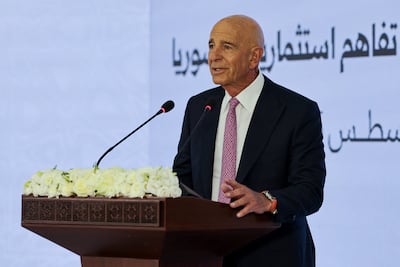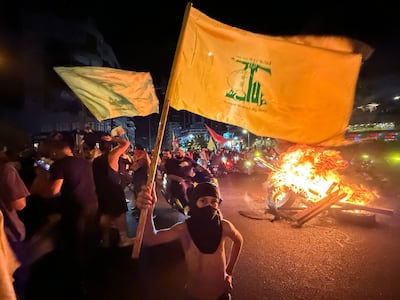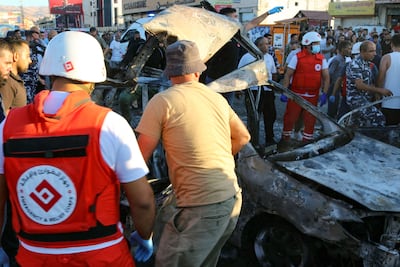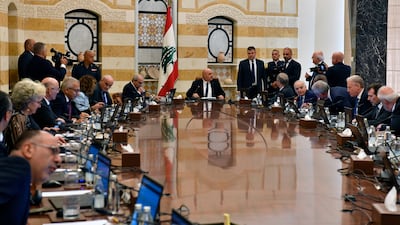Lebanon's government has agreed to disarm Hezbollah in a historic decision, despite Shiite ministers storming out of the session in protest.
Information Minister Paul Morcos said the cabinet agreed to end the presence of all armed groups in Lebanon, “including Hezbollah”, and approved the aims of a US proposal that would lead to the disarmament of the group and withdrawal of Israeli forces from Lebanese territory.
Mr Morcos said the cabinet approved only the goals of the US plan, and did not discuss it in full. “We did not delve into the details or components of the US proposal. Our discussion and decision were limited to its objectives,” he said.
The agreement was reached after Minister of Health Rakan Nasser Al Din and Labour Minister Mohammad Haidar, both nominated by Hezbollah, and Minister of Environment Tamara Zein, nominated by its ally the Amal Movement, all left the meeting.
Administrative Reform Minister Fadi Makki, who was not nominated by either party, also left the meeting, but not at the same time as his three colleagues. Mr Morcos said they withdrew from the talks but had not left the government. Finance Minister Yassine Jaber, who was also nominated by the Amal Movement, was not present due to travel obligations.
US envoy Tom Barrack congratulated Lebanon's leadership on a “historic, bold, and correct decision”. An Israeli strike killed five people as the meeting began.

Mr Makki described it as difficult situation. “From the beginning, I tried to work on bridging the gaps and bringing viewpoints closer between all parties, but I didn’t succeed,” he said.
“I left the session after my colleagues departed and the decision wasn’t easy, but I couldn’t bear the responsibility of making such a significant decision in the absence of a key component from the discussion.
“I hope everyone returns to the dialogue table to continue the discussion with the participation of all parties, ensuring national consensus and shared responsibility.”
Earlier on Thursday, President Joseph Aoun pledged to assert full control over weapons throughout the country “despite the difficulties”, after Hezbollah rejected a government plan to charge the army with disarming the Iran-backed group by the end of the year.

The “arms monopoly will be achieved despite the difficulties and obstacles”, Mr Aoun told Saudi news channel Al Arabiya. “Monopolising arms in the hand of the state does not harm Lebanon’s rights and sovereignty.”
The cabinet met to endorse a plan to disarm Hezbollah and other non-state actors after failing to do so at a turbulent session on Tuesday. That session ended without a vote but resulted in the announcement of a timeline for disarming all non-state groups by the end of the year, under a plan to be submitted by the army by the end of this month. Hezbollah and Amal Movement ministers walked out in protest.
Hezbollah on Wednesday rejected the motion outright and said it would treat it “as if it does not exist”.
As Thursday's meeting got under way, Hezbollah's parliamentary bloc called on the government to “correct the situation it has put itself and Lebanon in by slipping into accepting American demands that inevitably serve the interests of the Zionist enemy”.
Hezbollah has consistently rejected discussions over its arms until Israel stops its daily attacks on Lebanon and withdraws from five points of territory it continues occupy despite reaching a ceasefire with the Iran-backed group in November. It has said attempts to disarm it weaken Lebanon’s position amid Israeli and US “threats” against the country.

The US plan, submitted by special envoy Tom Barrack, reportedly calls for the government to commit to disarming Hezbollah by the end of the year – including heavy weapons and missiles – and to begin doing so within 60 days of issuing a decree to that effect, under a plan drawn up by the Lebanese army.
At the same time, Israel would cease all military operations and begin a phased withdrawal from its positions in Lebanon. The plan would lead to funding for reconstruction in areas damaged by the war last year, and support for the economy from the US, France and regional states.
Before leaving Thursday's meeting, Mr Haidar said there could be no “talk about disarming the resistance until the enemy has withdrawn, our prisoners have returned, the attacks have stopped and reconstruction has begun”.
After Tuesday's cabinet meeting, Gen Mounir Shehadeh, who until recently was the government's co-ordinator with the UN peacekeeping mission in Lebanon (Unifil), said the army was studying its decision “in a very detailed way and considering the difficulties of the plan which the government has tasked it with”.
“The relationship between the army and Hezbollah has always been good, even until now,” he added. “The government threw the ball into the Lebanese army’s court. The problem is not the decision, but the method of application of the plan by the Lebanese army.”
Tuesday's meeting coincided with a speech by Hezbollah leader Naim Qassem, in which he rejected disarmament. It was one of the most defiant public stances by the group – which suffered significant losses during its war with Israel – in months.
There has also been a strong reaction from Iran, Hezbollah’s main backer. Tehran's Foreign Minister Abbas Araghchi said: “This is not the first time they have tried to disarm Hezbollah. Now they think they can disarm Hezbollah, but the position of the Hezbollah leader showed that they stood firm and have a strong position.”
Mr Araghchi said Iran supported Hezbollah’s statement, but “would not interfere in the matter”.
Lebanon's Foreign Ministry condemned Mr Araghchi's comments, describing them as “unacceptable interference”.
As Thursday's cabinet meeting began, at least five people were killed and eight injured when Israel bombed a car in Deir Zenoun, in the eastern part of Lebanon's Bekaa Valley.
Elsewhere, Unifil said on Thursday that peacekeepers “discovered a vast network of fortified tunnels in the vicinity of Tayr Harfa, Zibqin and Naqoura”, including “several bunkers, artillery pieces, multiple rocket launchers, hundreds of shells and rockets, anti-tank mines and other explosive devices”.


